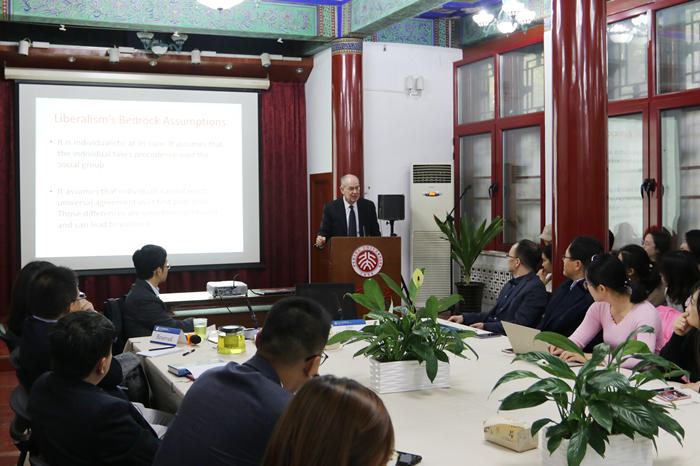On the morning of October 17th, 2019, the 39th session of the “North Pavilion Dialogue” lecture series was held by the Institute of International and Strategic Studies (IISS), Peking University (PKU). Mr. John J. Mearsheimer, a renowned professor of political science at the University of Chicago, gave a lecture entitled “The Great Delusion: Liberal Dreams and International Realities”. The lecture was chaired by Mr. Gui Yongtao, Vice President of IISS, PKU and Vice President of the School of International Studies (SIS), PKU.
In his lecture, Mr. Mearsheimer elaborated on the diplomatic strategy pursued by the United States to reshape the world in its own image by promoting liberal hegemony since the end of the Cold War and the bipolar system characterized by such era, with a particular focus on the key changes in the U.S. diplomacy, in the state of international security, and in the international order, based on the key viewpoints illustrated in his latest book The Great Delusion: Liberal Dreams and International Realities published in 2018. In particular, Mr. Mearsheimer discussed the following questions: What is liberalism? What is nationalism? What is liberal hegemony? Why has the United States been pursuing liberal hegemony? What are the specific practices of the United States’ pursuit of such liberal hegemony? Why has the United States’ pursuit of liberal hegemony failed? And where will the future of liberal hegemony go? Mr. Mearsheimer pointed out that liberal hegemony will not achieve its goal, and that the major reason for its failure is that the combined forces of nationalism and realism overpower that of liberalism.

Regarding the core issue of “how politics should address the threat of potential violent conflicts”, liberal hegemony usually emphasizes that universalism should be formed through the integration of individualism and inalienable individual rights, whereas nationalism tends to prioritize the individual’s shared community in the first place, emphasizing that the nation-state is the highest form of human social organization to this day, and that the right to self-determination is of great significance to a nation-state. Mr. Mearsheimer summarized the goals of the United States’ pursuit of liberal hegemony as follows: first, to promote liberal democracy on a global scale, second, to facilitate the integration of more countries into an open international economic system, third, to facilitate the integration of more countries into a universal international mechanism. Through summarizing multiple policy practices of the American liberal hegemony in recent decades, Mr. Mearsheimer further attributed the failure of the United States’ pursuit of liberal hegemony to the overly powerful influence of nationalism and realism, as well as the United States’ overemphasis on the importance of individual rights. Mearsheimer believes that Trump’s rise to power, along with the rise of China and Russia, marks the eventual demise of liberal hegemony.
(Contributed by: Fan Jiarui)
Editor: Li Fangqi Photographer: Zheng Peijie

